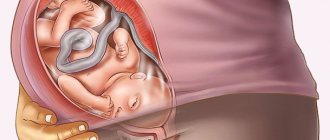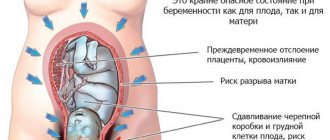Features of 38 (obstetric) weeks
Babies may be born two weeks before their official due date . Therefore, you can be firmly confident that over the next four weeks a long-awaited event will happen - a child will be born. Statisticians have noticed an amazing fact - girls prefer to be born slightly earlier than boys. Their birth often occurs precisely at these times.
There is a huge probability of labor occurring within this period of time. Especially in multiparous women, when at 38 weeks of pregnancy a woman already knows the characteristic precursors of labor and will not confuse them with anything.
Important! In the last trimester of pregnancy, it is undesirable for a woman to be away from home for a long time, especially to leave the city. But if there is a need for this, you should always have a fully charged phone and a package of accompanying documents at hand.
A characteristic feature of this week - literally the last days before childbirth - is considered to be a high degree of fatigue. The belly is so large that it is difficult to lie down or find a place to rest. It is difficult and uncomfortable to walk and sleep, and it is almost impossible to run a household. And it is from the 38th week of pregnancy that the belly begins to drop. For each of the future women in labor, this process occurs in its own way, for some slowly, and for others much faster.
Physiological features
During the entire period of gestation, women periodically note some changes in the nature of leucorrhoea. They may enlarge, acquire an abnormal consistency or foreign impurities. It is completely abnormal if the leucorrhoea becomes bloody; such cases require urgent gynecological intervention. Discharge at the 38th week of pregnancy is characterized by increased abundance, but there should normally be no bloody spots.
There is no need to panic if the mucous discharge has become more profuse than before conception, because so many changes occur in the pregnant body during these months that the abundance of discharge is considered a completely natural phenomenon. But in any case, the appearance of brown marks on the underwear should alert the patient. Such conditions require consultation with a doctor observing the patient.
At the thirty-eighth week, mucous leucorrhoea of a transparent nature is considered the most common. By this time, the baby has already formed, so labor can begin at any time. Sometimes at 38 weeks, girls notice a clot of mucus, which indicates a plug has come out. This means that the body is preparing for childbirth in the near future. Moreover, labor can begin either a day or two after the plug comes out, or a week or two after this event. These periods are considered quite normal.
Signs of impending labor at 38 weeks of pregnancy
- The stomach begins to drop, breathing becomes freer, and the syndrome of difficulty breathing disappears.
- Body weight does not increase, but within a few days it decreases by 2-3 kg, and heartburn goes away.
- The volume of mucus secreted by the vagina increases. The passage of the mucus plug is a direct sign of impending labor.
- More often, irregular false (training) contractions appear, reminiscent of menstrual pain, when at 38 weeks of pregnancy the lower abdomen pulls, as during menstruation.
- An imminent birth is also foreshadowed by liquefied stools. This organism is freed from ballast in preparation for childbirth. But symptomatic pain in the lower abdomen should not be observed during this process.
Not every woman carrying a child for the first time can foresee the onset of labor or simply see the mucus plug and recognize its rejection. Beginning at the 38th week of pregnancy (three to four weeks before the birth of the baby), the harbingers of labor in first-time mothers may remain without due attention, since not everyone knows the difference between false and true contractions. And since all sensations are individual, you can easily make a mistake.
The onset of labor is accompanied by true, not false (training) contractions, which can occur at any time. These are regular contractions that don’t let go, getting stronger each time. They do not go away, becoming more intense with each contraction. The intervals between rest pauses are reduced. If the frequency of the time interval (pause) between uterine contractions is at least 10-15 minutes, you can leisurely get ready for the maternity hospital and call for transportation without panic. Driving alone is strictly not recommended.
Placental abruption
If you are 38 weeks pregnant, your baby is actively moving at night or during the day and there is severe pain in the lower abdomen, this may be a sign of premature delivery of the placenta. Most often, this pathology is accompanied by bleeding. However, this is not always the case.
When a child's place is detached, acute oxygen starvation occurs, which doctors most often call hypoxia. In this case, the woman requires emergency surgery. Doctors usually perform an emergency caesarean section. Otherwise, not only the child, but also the expectant mother herself may die.

Fetus at 38 weeks of gestation
At this stage, the child is fully born and can exist independently outside the mother’s womb. The fetus completes its formation - it is physiologically ready to be born.

- There is no rapid weight gain observed. The average weight of a child is 2800-3100 g. Further, until birth, the weekly weight gain of the fetus will be no more than 200 g.
- The baby no longer grows and completely occupies the entire volume of the uterus, so its activity begins to decrease. The average height of the child is from 50 to 53 cm, and at this stage his head is clearly positioned towards the os of the uterus.
- On the head, with a circumference of about 35 cm, two fontanelles are clearly visible - large (up to 3.0 cm in diameter) and small (up to 0.5 cm). Reflexes have already turned on, and the reproductive system has fully formed.
- Starting this week, placenta aging is observed. It can no longer provide the fetus with the same amount of nutrients.
- Absolutely all the baby’s organs are fully formed. The pulmonary circulation has not yet started. Its activity will begin only after birth, as soon as the newborn takes its first breath. In the meantime, blood flow occurs through the systemic circulation.
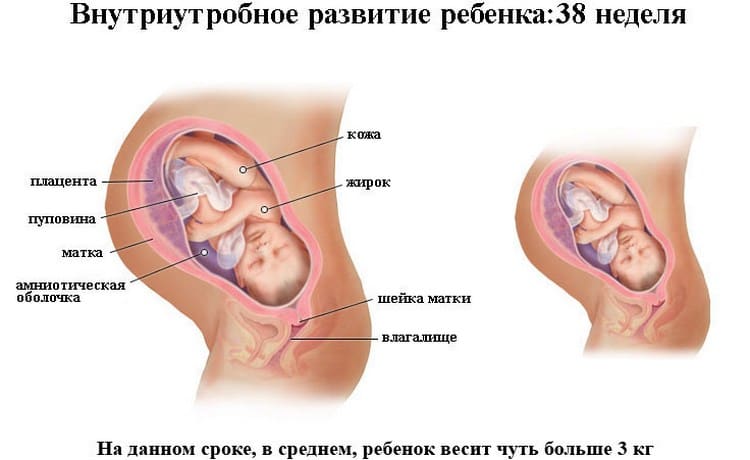
It is very important in the last stages to listen to the baby’s movements , and if he does not move for a long time, consult a doctor. You should also seek advice in the opposite case, if the child “gets angry” and becomes overly active. On average, the number of movements should be at least 10, but no more than 12 times in half a day.
Why at 38 weeks of pregnancy you want to sleep and have no strength
Expectant mothers often hear about their fatigue and constant sleepiness. This causes discomfort and anxiety for some. But there is no need to worry, because this is a common condition for pregnant women, both in the first and last stages.
From the very beginning of pregnancy, a woman’s body begins to rebuild. Throughout the entire period of bearing a child, hormonal changes occur. And it is precisely because of adaptation to these hormonal changes that some life processes slow down. Therefore, a pregnant woman needs much more energy than an ordinary person. Therefore, she gets tired faster and constantly wants to sleep.
The final period of fetal formation is the 38th week of pregnancy. A woman feels sleepy at this time, perhaps because the baby is ready to be born.
Indeed, 94-95 percent of women give birth between 38-39 weeks. At this time, the baby already weighs 3 kg, his height is 48-50 cm. The baby receives oxygen and nutrients through the mother’s placenta. Also, the fluff on his body and the amount of vernix lubrication are gradually decreasing. The child is already beating less, since the space in which he exists, that is, in the uterus, is decreasing. His movements are quite coordinated, and he is ready for life outside the mother's body.
So, if the period under consideration is the 38th week of pregnancy, drowsiness and fatigue should be examined, first of all, by a doctor. If this is caused only by hormonal imbalance, then you can relax. At the same time, doctors recommend getting plenty of rest and doing what a pregnant woman wants.
Tests will help determine the cause of drowsiness. In this case, the expectant mother should spend more time in the fresh air, read useful literature, and listen to relaxing music. That is, her brain should rest from overstrain. You should worry and worry less, eliminate stress and anxiety from your life.
Another important aspect of good health is proper and healthy nutrition. After all, her physiological state, and, of course, the health of the pregnant child depends on what the mother eats.
A pregnant woman's food should be full of all nutrients: proteins, fats, carbohydrates. The presence of minerals and vitamins is also required. The expectant mother should eat 5-6 times a day, and in no case overeat. Also, do not eat too spicy, sour and salty foods. A better option may be a salt-free diet. This must be done so that not only the diet is healthy, but also for the proper functioning of the intestines.
Physical activity is important for getting rid of drowsiness. Do not forget that in the last stages a pregnant woman should not remain in one position for a long time. Therefore, to do this, you need to change the position of your body every 15 minutes.
Severe drowsiness during pregnancy can be caused not only by hormonal imbalance, but also by an unpleasant condition provoked by changes in the body. In this case, we mean such common pregnancy companions as anemia and hypotension. Anemia in pregnant women occurs with iron deficiency, respectively, with low hemoglobin.
The fact is that when carrying a child, the volume of blood circulating throughout the body and providing the fetus with oxygen increases significantly. Hemoglobin is responsible for the delivery of blood, the production of which depends on the amount of iron in the body. Therefore, if there is not enough iron, then less hemoglobin is produced. This results in a lack of oxygen, which subsequently leads to drowsiness and fatigue during pregnancy. By the way, anemia can be recognized by other signs: pale skin tone, brittle nails, dizziness, shortness of breath.
To avoid anemia, you need to have a proper daily routine. You should devote enough time to sleep and rest, exercise, walks, and eating. To produce iron, your diet must include red meat, seafood, liver, and nuts. For good absorption of iron into the body, you need to drink natural juices and fresh juices. But milk and tea, on the contrary, slow down this effect, so for some time you need to exclude them from your diet, or reduce the amount of consumption. Sometimes doctors prescribe iron supplements. But self-medication is contraindicated, especially in late pregnancy. Therefore, you can take medications only after consulting a doctor. Also, drowsiness in late pregnancy can be caused by hypotension. This condition is caused by a decrease in blood pressure, which is very dangerous because the oxygen supplied to the baby is limited. For the fetus, a decrease in oxygen supply is extremely undesirable, as this can cause premature birth.
Hypotension also has the following symptoms: frequent dizziness, and in some cases even fainting. The consequences of this disease can be poor diet, frequent stays in stuffy rooms, and taking hot baths. To normalize life activity, you should follow the same regimen as for anemia.
To increase blood pressure, food should be varied and the amount of protein should exceed the usual norm. Portions should be small. A hearty breakfast and hot lunch are required. For dinner, green tea with sugar will be useful.
Before you begin to get rid of drowsiness, you must consult a doctor and identify the cause of its occurrence. Under no circumstances should you self-medicate during pregnancy, especially in the last stages of pregnancy. And it is important to remember that the health of a pregnant baby depends on the health of its mother.
Last weeks of pregnancy
Which weeks of pregnancy are considered the last - what do doctors say about this? How are these days going for expectant mothers, what worries them?
This definition includes the entire last obstetric month of pregnancy, that is, from the 36th to the 40th week. It is during these weeks that most women go into labor.
The last weeks of pregnancy are quite difficult. The weight gained over 9 months, the large baby who also moves quite painfully, and the uterus standing too high, putting pressure on the lungs and stomach, are taking its toll. And this is not all the problems. Fortunately, they will disappear very soon, and therefore mommy does not need to focus on them.
You need to think about what happiness awaits her in the near future and how to prepare for the birth of a new family member so that the first weeks after childbirth are as comfortable as possible for everyone.
It’s worth looking at them in more detail so that you know what is normal and when it’s best to see a doctor.
1. Heartburn.
Outside of pregnancy, this is a sign of stomach disease, most often gastritis. And expectant mothers have a variant of the norm. Although some women manage to avoid it. How do they do this? And it’s all about proper nutrition and some restrictions on food.
Firstly, there are a number of foods that cause heartburn in almost everyone. Surely you have these in mind too. For example, dishes that include tomato paste or ketchup (due to the vinegar they contain), in general, any dishes that contain vinegar. Peas also often provoke a burning sensation in the stomach, especially if they are undercooked. Make a list of unwanted foods and dishes for yourself and exclude them from your menu.
The second step is to stop eating before bed. Make it a rule not to eat any food later than 2-3 hours before bedtime. During this time, it will have time to be digested and go further into the intestines.
The third step to getting rid of heartburn is to sleep with your upper body elevated. To prevent gastric juice from refluxing into the esophagus.
Finally, always have Rennie or Gaviscon tablets on hand. If you experience discomfort in your esophagus or stomach, take them immediately. They act almost instantly.
As for Rennie, it contains calcium, which is why many mothers are afraid to take it in the last month of pregnancy. After all, it is known that too much calcium can lead to closure of the fontanelles in the fetus, which threatens difficult labor and intracranial pressure in the born child. But these fears are unfounded. “Rennie” contains a special form of calcium, which is simply not absorbed by the mother’s body and is immediately excreted unchanged.
There are many folk remedies for heartburn. For example, alkaline mineral water. Also a good option. But the effect of folk remedies is usually short-lived. Tablets are more effective in any case.
2. Heaviness due to large weight gain.
Normally, expectant mothers should gain 10-12 kilograms throughout their pregnancy. But in reality it often turns out that the number of kilograms is 2 times greater. And that’s why it’s hard for expectant mothers. Can you imagine gaining 20 kg in less than a year? It will be difficult for anyone here. And the mother’s body must also fully provide the baby with nutrition and oxygen. It will be easier if the weight stops in the last weeks, and if it is excess, it even decreases a little. Try to eat less if you have already gained 12 kg or more. There is no need to go hungry. But baked goods and sweets need to be limited.
3. Hydrops of pregnant women - swelling.
Swelling is a common problem. Usually occurs in the ankle area in the afternoon if mommy walks, stands or sits a lot. You should try to keep your legs elevated when resting in a chair or on a bed.
Should I reduce the amount of liquid I drink? No. This should not be done, nor should you completely eliminate table salt. Just try not to eat too salty, for example, chips, crackers, canned cucumbers and tomatoes. And you need to drink when you are thirsty. That is, not much, but not little either.
However, sometimes swelling becomes a reason for a woman to be hospitalized in a hospital. The fact is that it often accompanies a serious complication of pregnancy - gestosis. In this case, in addition to edema, the expectant mother experiences increased blood pressure and protein in the urine.
If you notice spots before your eyes, nausea, dizziness, swelling begins to increase sharply and appears on your face, you need to urgently call an ambulance.
4. Increased blood pressure.
The maximum normal pressure for expectant mothers, and indeed all people without exception, is 130 over 90. If it is higher, this is a pathology. However, there are situations that should be considered as a variant of the norm - this is if a woman’s blood pressure rises with severe anxiety. This usually happens in a doctor's office. In this case, the nurse measures mommy’s blood pressure again after 5 minutes, and it, as a rule, turns out to be normal or with a slight deviation from it. This is called white coat syndrome.
If mommy’s blood pressure rises at home, even at rest, this is a sign of hypertension or gestosis. It is necessary to take a drug that lowers blood pressure and, possibly, treatment in the pregnancy pathology department.
5. Why do you feel sleepy or suffer from insomnia in the last weeks of pregnancy?
The drowsy state can be compared to the first trimester of pregnancy. Due to physical difficulties, the body more often needs rest. Sleep while you can. You won't have to sleep a lot during the first months with your baby.
Insomnia is a consequence of anxiety and discomfort. Mommy simply cannot lie down comfortably or has to go to the toilet very often. So often that he doesn’t even have time to sleep properly after the next hike.
6. Vaginal discharge increases.
If there is simply clear discharge without odor or itching, or mucus, this is the absolute norm. When the discharge looks more like water, you suspect it is leaking, you need to go to the maternity hospital and do a special test. Doctors will tell you for sure whether your water is leaking or just heavy discharge.
7. Various pains in recent weeks - in the lower back, tailbone, pubis, between the shoulder blades.
During pregnancy, all existing “sores” worsen. This is why doctors advise giving birth at a younger age (before you develop chronic diseases). Thus, pain between the shoulder blades and in the cervical region is often caused by osteochondrosis. Pain in the pubis and lower back - symphysitis, separation of the pelvic bones. But if these pains are not painful and do not bother you around the clock, you just need to be patient and switch your attention to something pleasant. After giving birth, everything will gradually recover.
The baby is already fully developed. All organs and systems are functioning. All that remains is to gain a little height and weight. Changes are happening in mommy’s body. He's getting ready for the birth. The neck begins to gradually shorten and soften. And closer to the 40th week of pregnancy, the level of the pregnancy hormone progesterone decreases, which triggers labor.
Harbingers of an imminent birth are a decrease in the level of the uterus (visually the stomach drops), the passage of a mucus plug from the cervical canal, the so-called cleansing of the body - when a woman begins to have diarrhea without any signs of poisoning or intestinal infection.
But it happens that the 40th week begins, that is, the last, and there are no signs of imminent labor at all. Then doctors can advise methods of natural stimulation of labor. This could be cleaning the house, walking, climbing stairs. Sex in the last weeks of pregnancy also helps a lot. Sometimes women, after an act of love, immediately go to the maternity hospital. You can try active sex from the 38th week, when the fetus is completely full-term and viable.
If you're pregnant full term and don't have any signs of labor coming, don't worry. Some women normally carry their pregnancy until 42 weeks. And try to calculate the week of pregnancy based on your last period, because doctors sometimes make mistakes with the timing too. Perhaps your sentence is shorter than you thought? Or ovulation was late, and therefore the body is in no hurry to prepare for childbirth.
In the last weeks of pregnancy, you need to be very attentive to fetal movements. Although they say that closer to childbirth, children make themselves known less, there shouldn’t be any drastic changes. And if you haven’t felt your baby move during the day, this is a reason for an urgent visit to the doctor or even a trip to the maternity hospital.
Did you find the answer to your question?
Subscribe to our channel in Yandex.Zen
Interesting off-topic video:
2013-06-05T00:00:00
Often the question-complaint “Why do you want to sleep during pregnancy?” The doctor is asked by women in the early stages. In most cases, this is a normal condition that does not require treatment. After the fertilized egg enters the uterus and strengthens it there, the female body begins to increase the production of the hormone progesterone. Its excess is expressed in drowsiness, irritability and a feeling of depression.
A constant desire to sleep haunts the pregnant woman in the last weeks. At this time, the body is actively preparing for the upcoming labor. This condition is also considered safe. In addition to hormonal storm and chronic fatigue, there are a number of reasons why you want to sleep during pregnancy. Let's look at them in more detail.
When conception occurs, a woman’s body undergoes large-scale hormonal changes. They affect all internal organs and their systems. Here are a number of reasons that cause an irresistible desire to sleep.
- Decreased immunity. If the protection does not weaken, the “foreign body”, which is the embryo, will simply be rejected. This usually leads to decreased blood pressure, general weakness and drowsiness.
- Avitaminosis. Since a new organism is currently being formed, the reserve of nutrients (vitamins and other microelements) begins to deplete.
- Toxicosis. Many women are annoyed by toxicosis that exhausts them all day. Vomiting also helps flush out nutrients. As a result, anemia develops.
- Stress. A pregnant woman needs more time to rest. But it is not always possible to quickly switch to another mode. And the modern rhythm of life makes its contribution. Therefore, even very calm women in the early stages are in a state of constant stress.
- Nervous overstrain. This is due not only to the news about the upcoming replenishment, but also to the need to adapt to new circumstances and the desire to collect the maximum amount of information about the course of pregnancy. But you still need to think about how best to communicate the news to others - relatives and employees. By the way, the attitude of colleagues directly affects the state of mind of a woman expecting a baby.
- Prejudice. There are women who try at all costs to hide their pregnancy from others. They justify this by fear of the “evil eye.” Here is another reason to worry.
Changes in the endocrine sphere disrupt the entire established working rhythm. Pregnant women are prohibited from using standard stimulants (strongly brewed tea and coffee) - the risk to health and the fetus is too high. In the early stages, it is possible to overcome drowsiness with good nutrition, a reasonable balance of work and rest, and healthy sleep, the duration of which should be at least 8 hours.
It would be great if employees would accommodate their colleague's position and allow her to take short breaks to change positions or do exercises. After all, they themselves should feel uncomfortable working if there is always a tired person next to them who really wants to sleep.
If everything is more or less clear with drowsiness in early pregnancy, then where does it come from in the second trimester? It seems that the body has already managed to get used to the new state and has even developed its own regime, including mandatory attendance at consultations. Those around her congratulated her and accepted the fact of pregnancy with all the ensuing consequences as a given. But it turned out that not everything is so simple.
- The body still works all day long for two people - this significantly weakens it. Even if a woman is fully provided with adequate nutrition, the nutrients it contains are barely enough. And some still try to limit themselves in food, fearing a strong weight gain after childbirth. A deficiency of micro- and macroelements necessary for the proper functioning of organs and their systems causes a feeling of fatigue and a desire to sleep.
- Unfortunately, not everyone can easily and carefree carry a baby without experiencing any health problems. Swelling may appear at the equator of pregnancy. The doctor will definitely reprimand you for the extra pounds, notifying you of the dangers of being overweight. To top it all off, the woman begins to be haunted by thoughts that her loved one no longer likes her in this form. All these factors can provoke depression and sleep disorders.
To get rid of a depressive state, you need to walk outside more, eat well, and drink something relaxing before bed (for example, weak tea or a glass of warm milk with a spoonful of honey). If this does not help, the doctor may prescribe mild sedatives, and in serious cases, antidepressants.
The expectant mother should know that she should first of all ask her doctor about herbal therapy. Pregnant women can, in principle, practice herbal medicine, but very carefully. The list of permitted herbs is limited to valerian, mint and motherwort.
Starting from about 32 weeks of pregnancy, several more causes of drowsiness are added to all the above reasons:
- When your belly reaches an impressive size, it can be extremely difficult to get enough sleep. Sometimes it is only possible to lie down comfortably in the morning.
- Frequent visits to the toilet for minor needs are not uncommon during the third trimester. The enlarged uterus puts pressure on the bladder, causing increased urination. Of course, it’s impossible to rest normally in such a situation.
- If there are older children, they also require attention. Therefore, sleeping during the day is an unaffordable luxury for an expectant mother.
You should start learning to sleep on your side as early as the second trimester. First, you should roll up the blanket and place it under your stomach or back - whichever is more common for you to fall asleep. Then little by little, over a few days, you need to increase the height of the “roll”.
It is impossible to sleep on your stomach in the last months of pregnancy. And on the back is not recommended, no matter how much you would like it.
If you constantly squeeze the vessels through which nutrition and oxygen are supplied to the uterus and lower limbs, the reverse outflow of blood will be impaired. As a result, the unborn child suffers hypoxia, and his mother suffers serious health problems.
It is almost impossible to get enough sleep at 38 weeks. The body is actively preparing for labor. Training contractions do not allow a woman to relax even at night. Despite the fact that they last only 1-2 minutes, falling asleep after them is extremely problematic.
When an expectant mother is carrying a baby, her main task is to take care of both the child and her health. That’s why quality, healthy sleep is so important for a pregnant woman. One of the main rules of a pregnant woman should be “I sleep as much as I want.” It is recommended not to take part in highly stimulating activities. It is best to spend your free time on a leisurely walk, which will help you fall asleep quickly and peacefully. After returning from the street, it’s good to take a warm shower and drink a glass of milk. You should never take a hot shower or bath, even if you really want to.
You need to go to bed early. A good motivator is the realization that a successful pregnancy depends on this. It is advisable to go to bed before 22:00, since from this time until 01:00 sleep is considered to be of the highest quality. The bed should be of medium hardness. It is recommended that those expecting a baby sleep on their left side.
When a woman has already gone on maternity leave or is working from home, she can easily set aside a couple of hours for daytime sleep. If a pregnant woman is busy all day, she needs to plan her affairs correctly in order to be able to sleep well at night.
If the expectant mother is constantly struggling with an irresistible desire to fall asleep, but all her tests are in order and nothing else bothers her, there is no need to run to the doctor. You just need to lie down and relax. After all, any restrictions on rest or sleep can adversely affect the health of a woman and her unborn baby. Overexertion threatens to increase the tone of the uterus - an extremely undesirable and even dangerous condition.
Sometimes constant drowsiness alarms a pregnant woman. Then she needs to create conditions for a good rest. For example, take a walk down the street before going to bed, and on the weekends take an outing into nature. If there are no serious causes of illness, these methods should help.
- Why do you always want to sleep?
Drowsiness during pregnancy is one of the signs of conception. After fertilization of the egg, the woman’s body begins significant hormonal changes, so taste preferences change, a heightened sense of smell occurs, and other significant changes appear.
Immediately after conception, the female body adapts to the emerging new life inside the womb in order to protect the child from negative factors and provide the most comfortable conditions for development. Therefore, if you constantly want to sleep during pregnancy, especially in the first days of gestation, then this is due to physiological changes, which you should not worry about.
The 1st trimester is accompanied by significant changes; all the main internal organs are formed in the embryo; pregnancy hormones are produced in large quantities. The main causes of drowsiness lie in the production of progesterone, which tries to protect the fetus from stress, influencing the woman from the inside. Thus, the pregnant woman becomes calmer, and sleep, as you know, is relaxation not only for the expectant mother, but also an opportunity for the formation of an embryo in the absence of negative emotions.
Pregnancy and drowsiness, fatigue and some apathy in the early stages are considered normal. At the same time, already in the second trimester, the body’s activity should be restored. If you constantly feel a strong desire to sleep in the middle of pregnancy, this may indicate anemia and lack of nutrients, since the 2nd trimester is characterized by active growth of the fetus, it requires a constant supply of vitamins and microelements.
With constant anemia, iron deficiency occurs, and with it a decrease in hemoglobin, the cells that carry oxygen, is formed. In such a situation, the baby is not able to breathe fully, and hypoxia develops. A blood test will help diagnose the process, and subsequent drug therapy will restore the iron content in the circulatory system.
Additional factors that may cause drowsiness during pregnancy, both in the second and third trimesters, are the risk of preeclampsia or increased blood pressure.
If you really want to sleep in the 3rd trimester, in the last weeks (35-38 weeks), then this is also a normal physiological phenomenon. A woman’s body is under enormous stress, preparing for childbirth, which is never easy, so proper rest is required to recuperate before labor.
Various colds or allergic seasonal reactions during pregnancy also affect drowsiness and general fatigue.
If you constantly feel sleepy at the beginning of pregnancy, then it is better to listen to your body and rest. But many women work, and they are faced with the question of how to deal with drowsiness during pregnancy, because it is better to avoid caffeine during this period.
To help the body withstand the load and increase energy resources, you must follow some recommendations:
- Stick to a sleep schedule - sleep at least 10-11 hours, and go to bed at the same time. On weekends, it is better to set aside a few hours for daytime rest.
- The workplace should be frequently ventilated, and the air temperature should be within 19-21°C, since fatigue increases in a too hot room.
- Daily walks in the park, in the forest, where there is a lot of greenery and trees, will fill the body with oxygen, reduce drowsiness and have a beneficial effect on overall well-being.
- A strong desire to sleep can be overcome by drinking a glass of cool, clean water.
- Balance your diet by diversifying your menu with cereals, fruits and vegetables in order to consume large amounts of vitamins and nutrients.
In the morning, to cheer yourself up and reduce drowsiness, you can do a little gymnastics. Swimming is very beneficial for pregnant women, so exercising in the pool in the evenings will not only relieve fatigue, but also improve your well-being.
source
What happens to a woman at 38 weeks of pregnancy
The natural desire of many at 38 weeks of pregnancy is to give birth as quickly as possible in order to free themselves from the state of discomfort. The last trimester is extremely difficult both physically and psychologically. The gradually descending uterus is now located between the sternum and the navel and makes it possible to breathe a little easier. Shortness of breath is practically not observed, heartburn goes away, although not completely.
Unpleasant symptoms will go away as soon as the baby is born. The frequent urge to urinate will also go away. In later stages, visits to the toilet become very frequent. It is the uterus with the fetus that presses on the internal organs. Basically, the state of discomfort is caused by a combination of many factors:
- heartburn combined with a constant feeling of hunger;
- frequent visits to the toilet room “in a small way”;
- insomnia, and as a result - fatigue, feeling tired;
- tingling in the engorged, heavy chest;
- the stretched skin on the abdomen is itchy;
- pain bothers the sciatic nerve;
- pain is felt in the sacrum.
But when, at the 38th week of pregnancy, the stomach becomes hard, a feeling of pain comes in the lumbar region, and before that the mucous plug was rejected, this indicates the very beginning of labor, and you should be mentally prepared for contractions.
Visiting doctors
In the last trimester, visits to the doctor should be made at least once a week, or at least once every 10 days. In anticipation of childbirth, it is necessary to conduct a series of laboratory tests:
- General urine test, plus the presence of protein.
- Blood test (hepatitis, syphilis, HIV) for an exchange card to the maternity hospital.
- Ultrasound to specifically determine the location of the fetus and how the umbilical cord lies. Data on the condition of the placenta and examination of the cervix are very important.
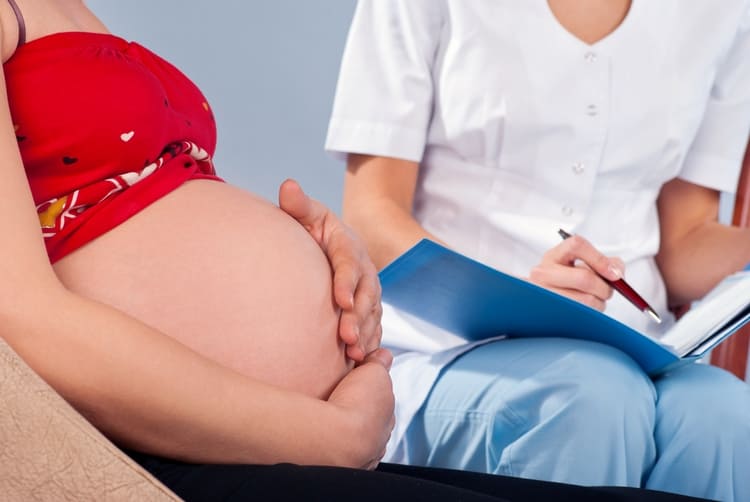
Depending on the results of the research, the doctor himself prescribes a time for a re-appointment, and an additional medical examination should not be neglected at all.
Deviations from norms
A routine ultrasound scan of the ninth month of pregnancy will display the true picture of the position of the baby in the womb. If by this time the fetus has not taken the correct position, namely, does not lie with its head towards the os of the uterus, the doctor may consider an alternative labor management tactic, in which it will be safest for the woman to give birth.
Today, the breech position of the fetus is no longer considered a big problem. In addition, many children turn head down at the very last moment. But with a transverse position of the fetus, you cannot do without surgery - independent childbearing in this case is unrealistic.
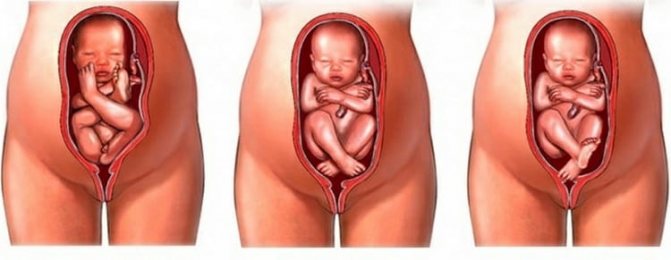
Nausea at 38 weeks of pregnancy
The uncomfortable state can be caused both by a number of physiological factors and by the manifestation of certain diseases.
Physiological factors include a large volume of food taken, when the contents of the stomach are thrown into the esophagus. This can cause not only nausea, but also vomiting. But mainly what causes nausea is:
- fatty foods;
- white bread and pastries;
- sharp slopes;
- physical effort;
- lying on your back or side without support pillows.
If you promptly remove the irritating factors that cause nausea, it will soon recede. In some cases, nausea can also manifest itself as a precursor to labor, intensifying in the intervals between contractions.

It’s another matter if a woman develops toxicosis late in pregnancy . Often this may be associated with cardiac disorders, or exacerbation or occurrence of kidney diseases. Medical consultation is necessary if, at 38 weeks of pregnancy, a number of specific symptoms are observed, accompanied by nausea and even vomiting:
- headaches, dizziness, fainting;
- high blood pressure, noise or ringing in the ears, spots in the eyes, heaviness in the back of the head;
- aching pain in the lower back, heaviness in the kidney area, swelling;
- pain in the stomach;
- cramping pain in the lower abdomen.
If even one symptom is present, urgent hospitalization and constant monitoring of the condition of not only the mother, but also the child are necessary. An emergency caesarean section is indicated in case of a threat to the life of both one and the other.
Discharge at 38 weeks of pregnancy
Vaginal mucus discharge is considered normal during the ninth month of pregnancy. But you need to pay due attention to their texture and color in a timely manner.
- light whitish discharge, with a normal, slightly sour smell - you don’t have to rush anywhere;
- a pinkish tint of mucus with the inclusion of bloody streaks is regarded as one of the early precursors of the onset of labor;
- a brownish tint appears - this is a mucus plug that has come off;
- copious discharge of cloudy fluid - water breaks, and you need to urgently go to the maternity hospital.
What's happening to the baby
The child’s weight usually exceeds 3 kg, but in some cases it can reach 4 kg, it depends on individual characteristics and hereditary predisposition. Height can also vary greatly (49-56 cm). Quite often during this period, women are hospitalized in the maternity hospital, where upon admission they undergo an ultrasound. The average values are:
- biparietal size – 93 mm;
- fronto-occipital - 118 mm;
- abdominal circumference - 33 cm;
- femur length – 71 mm;
- humerus length – 62 mm;
- the placenta reaches the third degree of maturity.
The diameter of the head is a fairly significant indicator, since if there is a serious deviation from the norm in a larger direction, the child may get stuck when passing through the birth canal. To prevent this from happening, before putting a woman into labor, the doctor carefully studies the examination data and decides on further tactics.
The baby, as a rule, took the final position (head or pelvic). If the baby is malpresented, there is virtually no chance that the baby will roll over. This is due to the fact that every day the baby becomes more and more cramped, and the amount of amniotic fluid gradually decreases.

Photo of an ultrasound of a child at 38 weeks of pregnancy
Lifestyle
In the last trimester of pregnancy, you should practice split meals, and eat little by little 5-6 times a day. The diet should include boiled meat, kefir and a lot of fiber. It is preferable to cook cereals in water. The food should be light to avoid stagnation in the intestines. The best option is to purchase products in markets for pregnant women, taking into account your due date.
The skin requires special attention, especially the breasts. Rubbing the mammary glands with a hard terry towel, a contrast shower, and massage using anti-stretch mark cream stimulate the uterus, preparing it for childbirth.

At 38 weeks of pregnancy, sex contributes to the natural birth of the baby. Thanks to intimacy, a woman’s blood flow in the pelvic area increases, and orgasm provokes uterine contractions. In addition, semen contains prostaglandin, which has a softening effect on the cervix.
Exercise in later pregnancy
How much physical activity can we talk about during the 9th month of pregnancy! Statistics say that most women in labor entered the delivery room in the midst of general cleaning of the house. Naturally, heavy lifting is excluded, and physical activity should be moderate. Otherwise, non-compliance with the regime threatens placental abruption, and, as a result, bleeding, which is especially dangerous in the last stages of pregnancy.
But if you have been involved in fitness, you cannot abandon your classes, you just need to proceed from your own capabilities. A very popular set of exercises for working the buttocks, stretching the muscles of the perineum and the adductor muscles of the thigh.
And no one canceled yoga classes (breathing exercises) - the program will greatly help at the time of childbirth.
Recommendations for a pregnant woman
- If there is no serious edema, you need, as before, to consume a large amount of liquid - drinking water (still), juices, compotes.
- Lead an active lifestyle as much as your situation allows. Do yoga, fitness. Choose the most comfortable position for your body to be in during labor.
- It is very important to remove fear of the upcoming birth from your mind. Communicate on forums, read relevant literature, consult a psychologist. And remember - a calm and maximally prepared woman always has a favorable birth outcome.
Introductory information
- Be sure to ask how often ultrasound can be done during pregnancy, and whether ultrasound will harm the fetus if more than three scheduled examinations are performed.
- Informed means armed. Find out when the third screening is performed during pregnancy and why it is necessary.
- For a woman expecting a baby, it is very important to know when the most dangerous weeks of pregnancy occur. What to watch out for and how to behave at critical moments.
- What is behind the diagnosis of placental abruption, what can cause it, and why in the later stages doctors pay special attention to this issue.
- Be sure to read up on what an epidural is, who it's for, what the risks are, and whether you need pain relief during birth.
- Read carefully how and why labor is induced, to whom it is indicated, and why labor needs to be induced.
Tell us about your experience of having a child. What advice would you give to women deciding to become mothers for the first time? How to behave in the maternity hospital, how to arrange your life after returning from the clinic, and how to learn to live with a new family member? We will be glad to receive your advice, which you leave at the bottom of the article.

